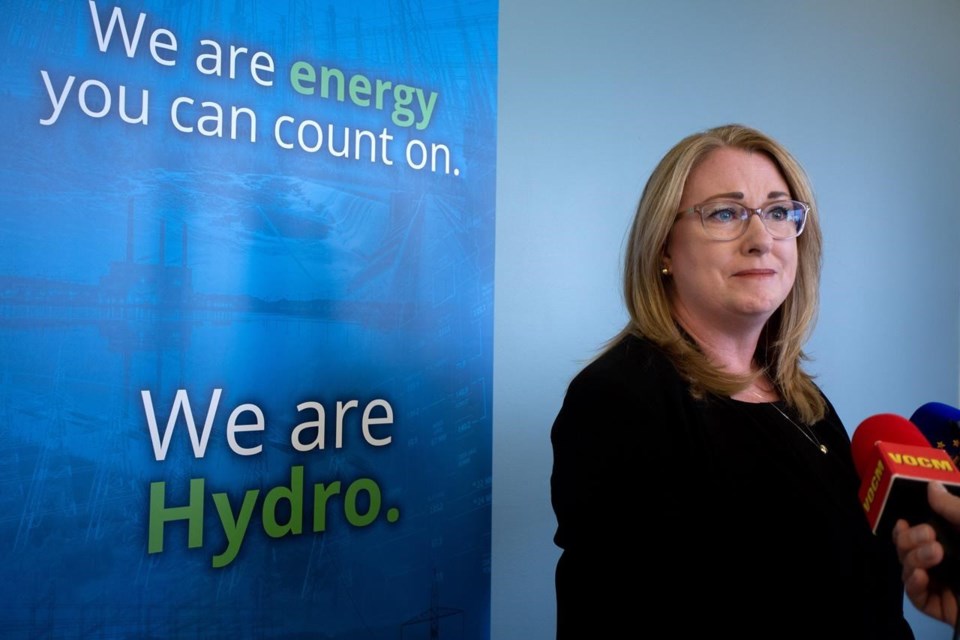ST. JOHN'S, N.L. — Though Muskrat Falls has weighed heavily on Newfoundland and Labrador's finances and residents' morale, reaction was surprisingly muted to an announcement this week that the project is finally considered to be in working order.
The project is years overdue and billions over budget, but Newfoundland and Labrador Hydro CEO Jennifer Williams' declaration Wednesday that the project is now considered "commissioned" came before a handful of reporters in a corporate boardroom. It prompted no press releases from politicians, nor did they post about the achievement on social media.
"There is still reason to be very skeptical about many aspects of the project," said St. John's businessman Des Sullivan, who has tracked the development for more than a decade on his blog, called Uncle Gnarly. "There are still massive questions surrounding this project .... I think that the Hydro CEO may be a little ahead of herself."
Muskrat Falls was officially approved in 2012 by the Progressive Conservative provincial government of the day. Its costs have ballooned from about $7.4 billion to more than $13 billion, and its setbacks were the subject of a lengthy public inquiry that began in 2018.
Williams got emotional Wednesday as she announced that the project passed a final round of testing on the 1,100-kilometre-long transmission system linking the generating station in Labrador to a converter station outside St. John's. Called the Labrador-Island Link, the transmission network, as well as the software that operates it, has been the source of most of the project's recent years of delays.
"The testing that we just concluded considers this project now commissioned," Williams told a handful of reporters, adding that there is still paperwork to complete with the federal government before it can be declared "officially commissioned."
"Commissioned" means Muskrat Falls is performing well enough to be factored into long-term planning, Williams said. But Sullivan is not convinced.¬Ý
"She is taking, by their definition, a single success and saying, 'Hey, we're out of the woods,'" he said in an interview. "Sorry, that's not how life works."
Larry Hughes, an engineering professor at Dalhousie University, agrees with Sullivan. He said the link hasn't yet performed well enough through a winter to be relied upon.
"Granted, this needs to come to an end somewhere, but they do need winter testing to demonstrate that this works," he said in an interview. "Because last winter, there were a great number of problems with their winter testing."
He pointed to the software issues as well as ice damage to power lines as examples. And there are still software updates and tests to come, Hughes and Sullivan noted.
Newfoundland and Labrador Hydro is waiting for an updated version of the Labrador-Island Link's software that will fix bugs found in February, Williams said Wednesday. The system passed tests over the weekend showing it can keep delivering 700 megawatts of power if one of its lines fails, but those tests will be repeated at 900 megawatts, she said.
Electricity rates in the province will also go up in order to pay for the project, though Williams said her team is still hammering out a "rate mitigation plan" with the provincial government. When the provincial government struck a financing deal with Ottawa in 2021, officials said they expected rates to climb to 14.7 cents per kilowatt hour when the project is officially commissioned, with regular increases each year.
Current residential rates sit at about 12.2 cents an hour, according to the Crown energy corporation's website.
St. John's artist Rhonda Pelley said she worries people won't be able to afford the rate hikes. Pelley has long been following Muskrat Falls news; in 2018, she created a series of Newfoundland tarot cards to examine the "psychic territory" that allowed the project to go ahead.
"I find Muskrat Falls to be one of the most heartbreaking things to happen to the province," she said in an interview, adding that Wednesday's commissioning announcement didn't alleviate any of that pain. "I still don't believe it's going to work."
A spokesperson for Premier Andrew Furey said he was unavailable for comment about this week's announcement.
This report by The Canadian Press was first published April 14, 2023.
Sarah Smellie, The Canadian Press




